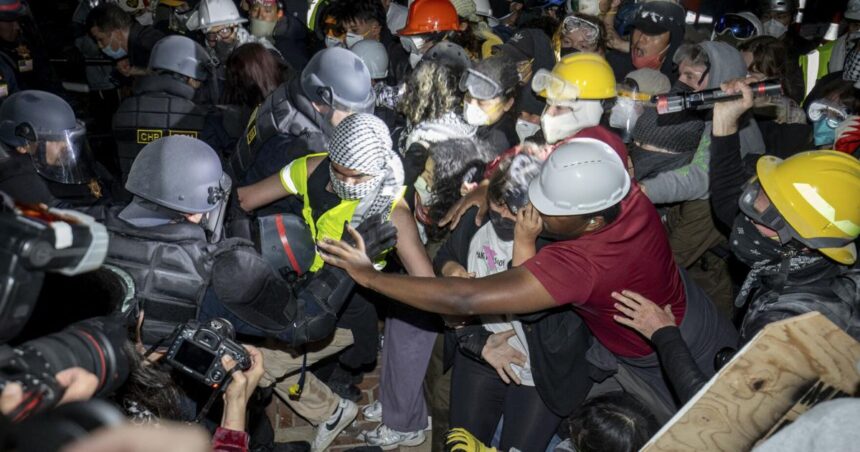At least 18 states don’t allow people to go about their streets wearing pointed Ku Klux Klan hoods. The white costumes serve the double purpose of racial intimidation and hiding the identities of the creeps inside them. Most of those anti-masking laws were passed early last century in response to Klan violence.
Froma Harrop
Today’s masking controversies attach to a very different issue, but the motives bear some similarities. Many of the pro-Palestinian campus demonstrators are pairing face masks with keffiyehs, a symbol of intifada. When the costumes reveal just a slice of face, the wearers look like ISIS terrorists, which could well be their intention.
At UCLA, some masked pro-Palestinian demonstrators were attacked by masked anti-pro-Palestinian demonstrators. Both sides were too cowardly to be associated with a look that future employers might not appreciate. And both groups apparently attracted outsiders looking for action.
People are also reading…
Most respectable institutions respect themselves. Colleges have been a special case in that many market their campuses as forums for protest. Columbia University, for one, ran a nostalgic retrospective of the violent campus unrest of 1968. You’d think it was its finest hour.
Cartoonists from across the country react to protests on college campuses against Israel’s war in Gaza.
Columbia has rules for protests, including that it be given advance notice. It hasn’t seen a point in enforcing them until the current situation. Columbia didn’t anticipate students with strongly held beliefs clashing with students holding other strongly held beliefs.
Whether these private universities want to tighten the rules or enforce them is up to them. But their educational role should be teaching students how to form their own opinions rather than handing them opinions. A welcome step in that direction was Harvard University’s recent announcement that it would no longer issue official statements on matters outside the university’s business.
How interesting and how overdue. None other than Harvard’s Institutional Voice Working Group wrote, “In issuing official statements of empathy, the university runs the risk of appearing to care more about some places and events than others.”
Similar policies have been adopted by the University of Chicago, Stanford University and Northwestern. It was never clear who cared about the pronouncements of university officials — at least until the war in Gaza unleashed passionate and conflicting opinions.
Campus life would be a lot more peaceful if these schools required demonstrators to show their mugs. That would not only put a brake on destructive behavior. It would also help the schools bar outsiders intent on using their well-groomed greens for partying or grifting — that is, collecting money for alleged causes and then pocketing it.
The media commit journalistic malpractice in letting these mystery protesters expound on their views but not share their names. In one egregious example, CNN interviewed someone covered in a mask and keffiyeh about the demonstrations. That person couldn’t be identified as a student or even as a man or woman.
Meanwhile, masks have become a favored accessory for shoplifters. Paired with a hoodie, they hide the criminals’ identities. The Los Angeles-based Kitson clothing chain has banned the wearing of face masks in their stores. Not only did masks enable theft, but they also made verbal harassment consequence-free.
New York Mayor Eric Adams is telling stores not to let anyone enter their premises wearing masks. Once inside, would-be shoppers can put them on, but their likeness had already been captured by the security cameras.
Some demonstrators, and probably shoplifters as well, argue unconvincingly that they are wearing masks for health reasons, citing the mandates during the COVID pandemic. But there are certain groups that should wear masks, older people and others needing to protect themselves from airborne germs.
Do the other groups — college protesters, shoplifters and Klansmen — have the right to obscure their identity? They say so, but they shouldn’t.
Harrop, who lives in New York City and Providence, Rhode Island, writes for Creators Syndicate: fharrop@gmail.com.





